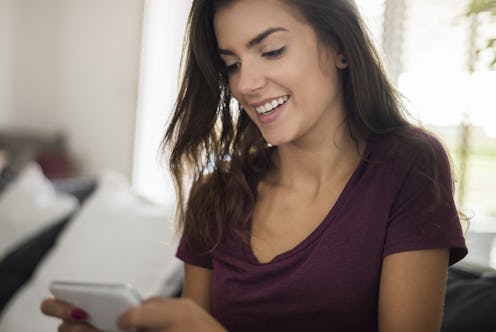
Hoo boy. The forthcoming existence of an app called "Every Girl Needs Her Gay," which fosters platotic friendships by matching straight women with gay men using dating app-style algorithms, is a real thing that is actually coming to a mobile device near you. But this vaguely messed up story has a happy(ish) ending.
So like, using dating app algorithms to match platonic friends is kind of a cool idea. And anything that puts a woman in charge of choosing her own adventure (romantic or otherwise) is definitely great. But beyond that, the idea for this app is kind of misguided.
As multiple outlets have pointed out, the idea of an app that helps women find "her gays" is super problematic. First of all, it tokenizes gay men by reducing them to collectible items for a straight woman's accessory pile. Second of all, the app's creator cites research in support of her app that shows straight women and gay men inherently trust each other for man-dating advice more than members of other groups; all parts of this assessment fail the Bechdel test. Presumably a straight women/gay man friendship is based on much, much, much more than their mutual interest in dick and how to get it. To reduce them to this is demeaning to both parties and frames the whole relationship around some off-screen embodiment of the patriarchy (or: a date-able man).
Moreover, the "GBF" (or gay best friend) and his "fag hag" — actual language used by the app in depiction of its future users — are reductive stereotypes that can't possibly capture the complexity of real people and their real personalities.
Luckily, the app's developer, a self-identified middle-aged woman and "old school hag" named Gini Garbick, heard the critiques she was getting and actually listened to the complaints. (Told you there was a happy ending!) She took down the app's website, which was promoting its January 2016 release, and is currently rebranding to be a more inclusive venture, hinging less on tired stereotypes.
"I needed to listen to where it went so horribly wrong, and get my head around why everyone was so upset by this idea. I needed to catch my breath, and get to work understanding what is going on within our communities, and the gay communities, and those who felt marginalized and disrespected, and why. I couldn’t move past it until I understood it. So I got to work."
She also acknowledged to Mic that the generation gap might account for her less-than-progressive ideas about the fluidity of gender, sexuality, and how they inform our connections to one another:
"I'm older than the bloggers and tweeters and maybe have missed the evolution that has taken place between my day and this great new day where there is a broader acceptance of ... everyone but a middle-aged woman who was just looking for her Boston Gay."
Well, snark notwithstanding, it was sort of refreshing to see an app developer humbled by criticism and willing to change direction, rather than defensively plodding on and labeling all detractors "oversensitive millennials."
Images: Fotolia; Giphy